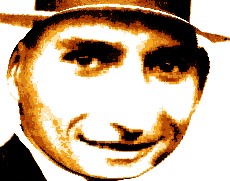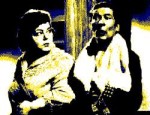Film Review
Has Fascism triumphed - not through war or some other dramatic
political upheaval, but through the insidious silent creep of
technology into every facet of our lives? That is the question
which is posed by this singularly disturbing film, which draws
frightening parallels between the Nazi Holocaust
and the way in which individuals are treated today by
large corporations. Intelligently scripted and with an
extraordinary central performance from Mathieu Amalric,
La Question humaine is both a
provocative and daring exploration of contemporary themes and a sombre
reflection on the Nazi holocaust. More crucially, it is a highly
relevant piece of social commentary that drives home some deeply
worrying truths about the present direction in which we may be heading.
Nicolas Klotz's inspired adaptation of François Emmanuel's
acclaimed novel of the same title is a thought-provoking and stylish
piece of cinema, one that manages to be both visually arresting
(through the slickness and stark economy of its mise-en-scène)
and utterly, utterly chilling (through its bleak subject matter).
What the film shows us is a dystopian vision of the world in which
uniformity and conformity are deemed to be far more preferable than
individuality and creativity, and where those in control are able to
abuse science and technology to create a world in which colour and
diversity are totally eliminated. It is a vision that we can so
easily see reflected in our own present reality, particularly for
anyone who has had the dubious privilege of working for a large company
and seen first hand how such organisations operate.
What
La Question humaine
shows us is a world in which the nobler human attributes are not just
undervalued but considered dangerously subversive. People are
hired by companies not for their personal qualities, but as work units
that will merely help to maximise the efficiency of the operation
(and/or service the personal ambitions of those higher up in the
pecking order). If these work units prove to be inefficient and
incapable of meeting the present business objectives, they must be
dispensed with - decommissioned and dumped like any other item of
apparatus.
When human beings are regarded as objects, as mere biological machines,
when they are appreciated only for their productive output, then we are
well on the road towards a Fascist technocracy, a Hell on Earth where
the human spirit has been extinguished, leaving behind a population of
grey, soulless automata doing things productively that have absolutely
no benefit to anyone. What makes this film so potent, so
shocking, so unforgettable, is that once you have seen it you realise
just how close we have come to making this horrifying prospect a
reality. A cynic might argue that we are already there.
© James Travers 2010
The above content is owned by frenchfilms.org and must not be copied.
Film Synopsis
Simon Kessler is a corporate psychologist who works in the
human resources department of a Paris-based petrochemicals
company. One day, Karl Rose, one of the directors of the company,
commissions him to make a discrete study of managing director Mathias
Jüst. The latter's mental state has begun to cause concern
amid the upper echelons of the company and Rose is anxious to discover
what lies behind it. As Simon proceeds with his strange
investigation, he can have no idea of where it will end - with the
unearthing of some dark secrets from the past...
© James Travers
The above content is owned by frenchfilms.org and must not be copied.



